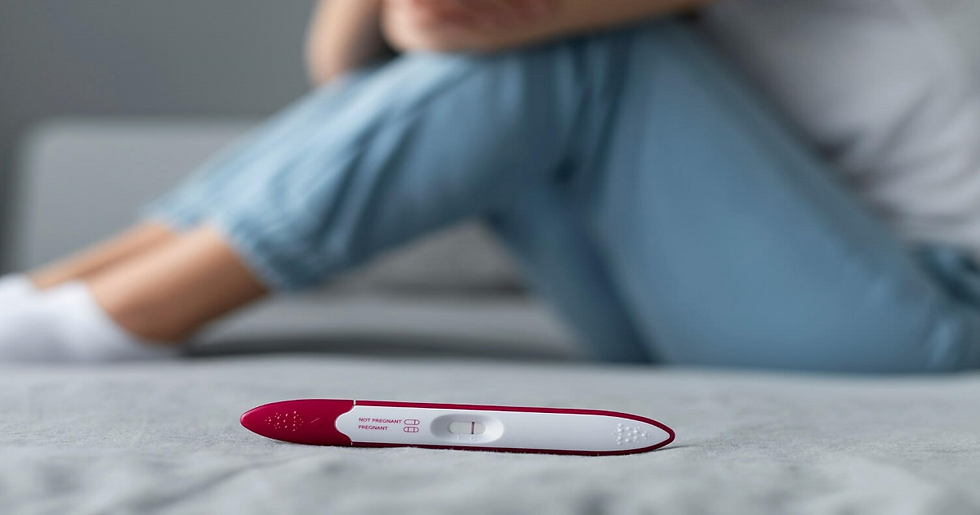Infertility: Your Guide to Treatment Options
- Bisma Jamal
- Sep 23, 2024
- 6 min read
Infertility is a deeply personal and challenging journey that many couples face, and it can be a source of significant emotional and physical stress. In Dubai, where medical advancements are at the forefront, a wide range of infertility treatment options are available. Understanding these options can help couples make informed decisions and improve their chances of starting or expanding their families. This guide explores the various treatment options for Infertility in Dubai, providing insight into what each entails and how they might fit into your journey to parenthood.
Understanding Infertility
Infertility is generally defined as the inability to conceive after one year of regular, unprotected intercourse. For women over 35, this timeframe is shortened to six months. Infertility can be due to issues in either partner or a combination of both. For women, common causes include ovulation disorders, blocked fallopian tubes, endometriosis, or age-related factors. For men, infertility is often related to low sperm count, poor sperm motility, or structural issues. In some cases, the cause of infertility remains unexplained, even after thorough medical evaluation.
The Importance of Early Diagnosis
Early diagnosis is critical in the treatment of infertility. The sooner a couple seeks help, the better their chances of finding an effective solution. In Dubai, advanced diagnostic tools and techniques are available to identify the root cause of infertility. These include hormone testing, ultrasound imaging, hysterosalpingography (HSG), laparoscopy, and semen analysis. These tests help healthcare providers understand the specific issues that may be preventing conception, allowing for a targeted treatment approach.
Treatment Options for Infertility in Dubai
1. Ovulation Induction
Ovulation induction is a common treatment for women who do not ovulate regularly or at all. This treatment involves the use of medication to stimulate the ovaries to produce eggs. Medications like clomiphene citrate or injectable gonadotropins are commonly used for this purpose.
Clomiphene Citrate: This oral medication is often the first line of treatment for women with ovulatory disorders. It works by stimulating the release of hormones that are necessary for ovulation.
Gonadotropins: These are injectable hormones that directly stimulate the ovaries to produce multiple eggs. Gonadotropins are often used when clomiphene citrate is not effective or when a more aggressive approach is needed.
Ovulation induction can be used in conjunction with other fertility treatments, such as intrauterine insemination (IUI) or in vitro fertilization (IVF), to increase the chances of conception.
2. Intrauterine Insemination (IUI)
Intrauterine insemination (IUI) is a less invasive fertility treatment that involves placing sperm directly into the woman’s uterus around the time of ovulation. This procedure increases the number of sperm that reach the fallopian tubes, thereby improving the chances of fertilization.
IUI is often recommended for couples with unexplained infertility, mild male factor infertility, or cervical mucus issues. It is also used in cases where ovulation induction has been successful but conception has not occurred naturally. The procedure is simple and can be performed in an outpatient setting, making it a popular choice for many couples.
3. In Vitro Fertilization (IVF)
In vitro fertilization (IVF) is one of the most effective and widely used fertility treatments. It involves the fertilization of an egg with sperm outside the body, in a laboratory setting. Once the embryos develop, one or more are transferred back into the woman’s uterus, where implantation may occur.
IVF is often recommended for couples who have not been successful with other treatments, as well as for those with more complex infertility issues such as blocked fallopian tubes, severe male factor infertility, or advanced maternal age. The IVF process involves several steps:
Ovarian Stimulation: The woman is given medication to stimulate the ovaries to produce multiple eggs.
Egg Retrieval: The eggs are retrieved from the ovaries using a minor surgical procedure.
Fertilization: The eggs are fertilized with sperm in a laboratory.
Embryo Transfer: One or more embryos are transferred to the uterus.
IVF also allows for the use of additional techniques, such as intracytoplasmic sperm injection (ICSI) and preimplantation genetic testing (PGT), which can enhance the chances of success.
4. Intracytoplasmic Sperm Injection (ICSI)
Intracytoplasmic sperm injection (ICSI) is a specialized form of IVF that is particularly useful for couples with severe male factor infertility. In ICSI, a single sperm is carefully selected and injected directly into an egg to facilitate fertilization. This technique bypasses many of the barriers that might prevent natural fertilization, such as low sperm count or poor sperm motility.
ICSI is often recommended for couples who have had poor fertilization rates in previous IVF cycles, or when there are significant abnormalities in the sperm. By directly injecting the sperm into the egg, ICSI significantly increases the chances of successful fertilization and embryo development.
5. Donor Eggs and Sperm
For some couples, the use of donor eggs or sperm may be the best option for achieving a successful pregnancy. Donor eggs are often recommended for women who have poor ovarian reserve, are of advanced maternal age, or have genetic conditions that could be passed on to their offspring. Donor sperm is typically used in cases of severe male infertility, genetic concerns, or in single women and same-sex couples wishing to conceive.
In Dubai, egg and sperm donation is conducted under strict ethical and legal guidelines to ensure the safety and well-being of all parties involved. Donor eggs and sperm are carefully screened for genetic and infectious diseases, and the process is designed to provide the highest chances of success for the recipient couple.
6. Egg Freezing
Egg freezing, also known as oocyte cryopreservation, is a fertility preservation technique that allows women to store their eggs for future use. This option is particularly valuable for women who are not yet ready to conceive but want to preserve their fertility for later in life. It is also an option for women who need to undergo medical treatments, such as chemotherapy, that could impact their fertility.
The egg freezing process involves stimulating the ovaries to produce multiple eggs, which are then retrieved and frozen for future use. When the woman is ready to conceive, the frozen eggs are thawed, fertilized, and transferred to the uterus through IVF. Egg freezing offers women the flexibility to plan their families on their own terms and is an increasingly popular choice in Dubai.
7. Embryo Freezing
Embryo freezing, or embryo cryopreservation, is another fertility preservation option that involves freezing embryos for future use. This technique is often used in conjunction with IVF, where any embryos not immediately transferred to the uterus are frozen for later use. Embryo freezing is a valuable option for couples who may want to have additional children in the future without undergoing another full IVF cycle.
Embryo freezing is also beneficial for couples who may need to delay pregnancy for medical or personal reasons. The frozen embryos can be stored for several years and used when the couple is ready to proceed with their family-building plans. The success rates for pregnancies from frozen embryos are comparable to those from fresh embryos, making this an effective option for many couples.
8. Gestational Surrogacy
Gestational surrogacy is an option for couples where the woman is unable to carry a pregnancy to term due to medical reasons. In this arrangement, an embryo created through IVF is transferred to the uterus of a surrogate, who carries the pregnancy on behalf of the intended parents.
Gestational surrogacy is a complex process that involves legal, medical, and emotional considerations. In Dubai, surrogacy arrangements are carefully regulated to ensure that the rights and well-being of all parties are protected. Intended parents and surrogates work closely with medical professionals and legal experts to navigate the process and achieve a successful outcome.
Lifestyle and Emotional Support
While medical treatments play a crucial role in overcoming infertility, the importance of lifestyle changes and emotional support cannot be overstated. Couples undergoing fertility treatments often experience significant stress, anxiety, and emotional turmoil. It is essential to address these challenges through proper support and self-care.
Maintaining a healthy lifestyle is an important part of the fertility journey. This includes a balanced diet, regular exercise, and avoiding substances like tobacco and excessive alcohol, which can negatively impact fertility. Additionally, managing stress through mindfulness practices, counseling, and support groups can help couples navigate the emotional aspects of infertility.
In Dubai, there are numerous resources available for couples seeking emotional support during their fertility journey. Fertility clinics often provide counseling services, and there are various support groups where couples can connect with others facing similar challenges. These resources can be invaluable in helping couples cope with the ups and downs of infertility treatment and maintaining a positive outlook.
Conclusion
Infertility is a complex and deeply personal challenge that affects many couples in Dubai and around the world. However, with the advanced medical treatments and supportive resources available, there is hope for those seeking to start a family. Whether through ovulation induction, IUI, IVF, or other advanced techniques, there are numerous effective solutions to address infertility.
The journey to parenthood may be filled with challenges, but with the right support and guidance, couples can navigate this path successfully. Early diagnosis, personalized treatment plans, and a focus on emotional well-being are key factors in overcoming infertility. By exploring the options available and seeking the best possible care, couples in Dubai can increase their chances of achieving their dream of parenthood.




Comments